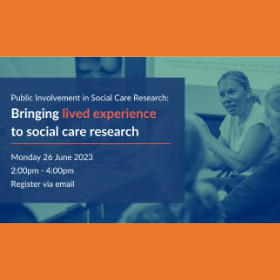All the events here are relevant to people working in dementia research. If you would like to add your own you can submit an event

- This event has passed.
Bringing Lived Experience to Social Care Research
26/06/2023 @ 2:00 am - 4:00 pm

Do you want to bring a lived experience in social care to your research?
Join the Public Involvement in Social Care Research group where you will discuss your research with researchers & people with lived experience.
Monday 26 June 2023
Register via email to: Ana@shapingourlives.org.uk
In the realm of social care research, the voices and perspectives of individuals with lived experience are of paramount importance. Their invaluable insights have the power to shape policies, programs, and interventions that can truly address the complex and nuanced needs of those receiving care and support. Recognizing the significance of incorporating these prospectives into research endeavors is not only a matter of ethical responsibility but also a means to enhance the overall quality and effectiveness of social care systems.
People with lived experience possess an intimate understanding of the challenges and realities faced by individuals who require social care. Their personal encounters with the system, whether as recipients of care or as caregivers themselves, provide a unique lens through which to analyze and improve social care practices. Their voices hold the key to unlocking deeper insights into the lived realities of those navigating the intricacies of social care services, uncovering nuances that may otherwise remain hidden.
By involving individuals with lived experience in the research process, researchers can gain a deeper understanding of the multifaceted dimensions of social care. These individuals can contribute firsthand knowledge and perspectives that go beyond statistical data or academic theories, offering invaluable qualitative insights. Their input can shed light on the emotional, psychological, and social impacts of social care, as well as the challenges and barriers faced by marginalized communities or specific populations.
Furthermore, the involvement of people with lived experience in social care research promotes a more inclusive and participatory approach. It recognizes that those directly affected by social care policies and practices should have a say in shaping them. Including their perspectives helps to democratize the research process, ensuring that decisions are not made solely by academics or policymakers but are instead informed by those who have personal stakes in the outcomes.
Incorporating the prospectives of people with lived experience can also enhance the relevance and applicability of research findings. Their input helps to bridge the gap between theory and practice, ensuring that research findings are grounded in the realities of those who need care and support. This can lead to the development of interventions and policies that are more tailored, sensitive, and responsive to the diverse needs of individuals within social care systems.
However, involving people with lived experience in research goes beyond tokenistic representation. It requires genuine collaboration, active engagement, and the creation of supportive spaces where their voices can be heard and respected. Ethical considerations, such as informed consent, confidentiality, and protection from harm, must be at the forefront of any research involving vulnerable populations.
In conclusion, integrating the prospectives of individuals with lived experience into social care research is crucial for fostering a more comprehensive and person-centered approach to care. Their insights have the power to inform and transform social care systems, making them more inclusive, equitable, and effective. By recognizing the expertise that comes from lived experience, we can create a more compassionate and empathetic society that truly meets the needs of those who require care and support.


